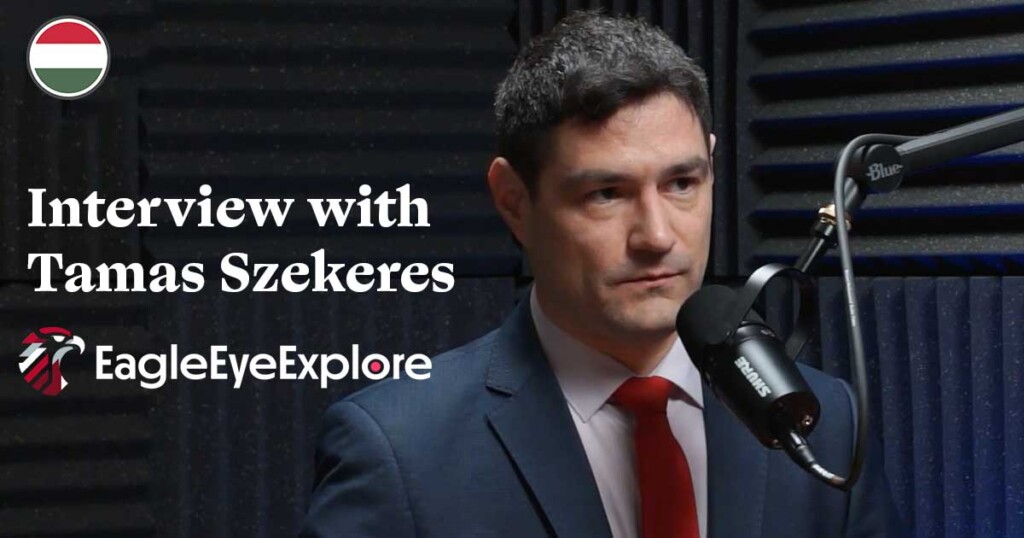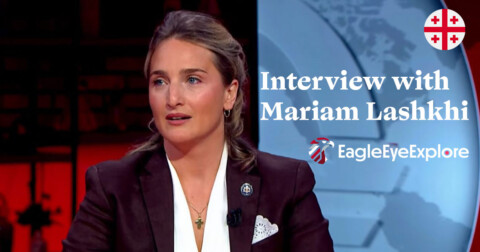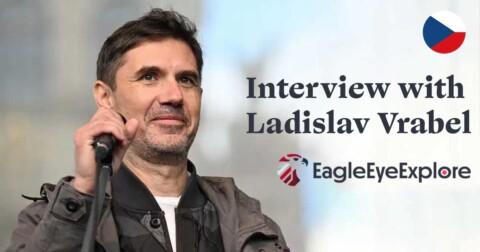Tamás Jenő Szekeres is a Hungarian geopolitical analyst, philologist, and cultural scholar who has been living and working in Sofia for the past 12 years, closely monitoring developments across the Balkans. He was born in Pécs, in the Baranja region. Since 2013, he has resided in Bulgaria, where in 2016 he embraced Orthodoxy. Since 2018, he has been active in the Bulgarian organization “Preporod.” We open a series of discussions with him on geopolitics and the prospects of Eastern European relations.
One topic that has recently sparked intense debate—not only among the Serbian but also the global intellectual community—is the imposition of neoliberal ideology in education. Is Hungary facing attempts to “colonize” its education system, and how is it resisting the trends coming from the EU?
I consider myself ethnically Hungarian (although I also have partial Polish, Serbian, and even Bulgarian roots). I completed both religious primary and secondary education, and during the era of Hungary’s Euro-socialists, I received a values-based, religious, and patriotic upbringing. Until 2010, in state schools, the influence of liberal ideology was undoubtedly present, which I encountered during my university studies—but by then, I had a solid foundation thanks to my religious schooling. In general, religious schools in Hungary have a long tradition and are popular even among the less religious citizens—largely because of the high academic standards they offer. Between 2002 and 2010, Hungary’s education followed the EU’s destructive trends—until Viktor Orbán’s victory. Hungary has since tried, as much as possible, to avoid adopting EU directives, especially those related to woke ideology, while protecting traditional values and preserving national memory. Hungary places great importance on religious studies in schools (which remain optional). Though a member of the EU and thus subject to certain limitations, it still makes efforts not to implement anti-traditional directives. The success is visible, and the stakes are high: it’s about shaping the worldview of future generations. The foundation of society lies in intellectuals with a sound mind.
It seems that modern history hasn’t recorded as many high-level Serbian-Hungarian initiatives as we’re seeing today. There’s even talk of military cooperation. How do you view the prospects of cooperation between the Serbian and Hungarian states?
As a geopolitician and particularly as a Hungarian patriot with partial Serbian roots, I’m happy to see that relations between Serbia and Hungary are steadily improving. It’s worth noting that during the Middle Ages, under the Nemanjić dynasty, Serbia and Hungary also enjoyed excellent relations—marked by three centuries of successful strategic cooperation. From the 18th to the 20th century, due to misguided Habsburg policies and the fact that Hungarians themselves were not independent until 1918, Serbian-Hungarian relations suffered. But today, we are living in a truly historic moment—witnessing the revival of old Serbian-Hungarian friendships from the Nemanjić era.
I am particularly pleased that Mr. Viktor Orbán and Mr. Aleksandar Vučić have discussed military cooperation. Serbia and Hungary are, in my opinion, the most important regional state entities. These are two nations with historical authority and true history (not fabricated pseudo-histories). Tradition, as well as a love for freedom, honor, glory, and heroism, are equally important to both of us. We share a similar past and experiences (let me remind you that Hungary’s greatest poet, Sándor Petőfi—born as Aleksandar Petrović—was of Serbian origin).
Is the most dominant common denominator the fight against globalism?
In my view, it is no coincidence that we have found one another at this exact moment in a shared struggle for freedom and against globalism. In the 20th century, both nations experienced national catastrophes, learned to organize multiethnic state structures, and endured the lesson of being used as cannon fodder by great powers—only to be later betrayed. We also know what it means for thousands of civilians to die under foreign bombs, what occupation feels like, and how victors redraw borders. We know well the attempts at secession of sacred ancestral lands and what it means to leave “compatriots abroad” under foreign rule and repression.
With such experience—even in recent memory—Serbia and Hungary, as states, can provide regional stability. And if we add Slovakia, which for ten centuries was part of the historic Hungarian state (I must emphasize here that the Kingdom of Hungary as a multiethnic state and today’s Hungary as a monoethnic state are two distinct concepts), then we’re already speaking of a serious geopolitical factor with a strategic position stretching from the Šar Mountains to southern Poland.
Does the geopolitical construct you mention also include the historical Serbian lands—Republika Srpska, Montenegro, perhaps North Macedonia?
The plan is for Republika Srpska to join as well, which would give this geopolitical construct the potential to effectively block the globalists’ ambitions throughout the region. Given that the Russian Federation is also a sovereign country, we can naturally count on Russian support. If we manage to include Bulgaria and/or Montenegro in this structure, we also gain access to the sea, which would enhance trade and, if necessary, enable allied support via maritime routes. I must emphasize that through Bulgaria and access to the Black Sea, we can establish a direct naval connection with the Russian Federation. In my opinion, this alliance and its expansion are of vital importance for the entire region.
There is a perception that Hungary maintains special ties with Poland. Can you clarify that position, especially considering the differing attitudes of the two countries regarding the Ukrainian crisis? Hungary seems to be successfully maintaining balanced relations with both Moscow and Warsaw, which is almost unbelievable.
Hungary is considered a Central European country in cultural, civilizational, and historical terms. Genetically speaking, most Hungarians descend from various Scythian and Slavic peoples (ruled by a Hunnic military-political elite from the late 9th to early 14th century). Incidentally, an integral part of the Hungarian nation are the Jasz (Hung. Jászok), who speak Hungarian and are fully integrated into the society of the Carpathian Basin, but are also proud of their Ossetian origin. Through their Scythian-Slavic lineage, Hungarians are connected to the Poles—they share a similar genetic structure—and the Poles were ruled by a Sarmatian military-political elite. Today, the two nations speak different languages, but they are bound by a shared past, shared experiences, victories, and suffering. Hungarians and Poles often disagree on certain issues, but we maintain our friendship regardless of the circumstances. Just as with the Serbs and Hungarians, so too with Poles and Hungarians—these are two nations with real histories and their own authority. Poland and Hungary are thousand-year-old nations with experience in organizing, preserving, and maintaining multinational state systems and stability—something Ukraine lacks.
Poland and Hungary each have their own identity and—if you will—imperial mindset. They do not have to define themselves as anti-states in the way Ukraine currently functions as a kind of “anti-Russia.” Therefore, the disputes between Poland and Russia are territorial and partly religious-civilizational, while Ukraine’s disputes are purely paradigmatic. Ukrainian pseudo-nationalism and chauvinism are primarily anti-Russian but also have an anti-Polish edge, as seen in Volhynia in 1943.
We cannot exclude territorial aspirations by some of Ukraine’s neighbors. What might the map of Europe look like after this war?
There is a possible scenario in which Ukraine is divided between Poland and Russia, with Hungary potentially regaining Transcarpathia. In the past century, we witnessed several failed attempts to establish an independent Ukrainian state. Frankly, I’m not convinced the current attempt will succeed either. One such attempt in the 17th century ended with a Polish-Russian partition. In an ideal scenario, a Polish government might reach an agreement with the Russians, which could bring an end to the nightmare that began in Kyiv in 2014. From a pan-Slavic perspective, reconciliation between Poland and Russia would be both necessary and fruitful. In such a reconciliation between Poland and Russia, Hungary—and even Serbia—could play a helpful role, no matter how unbelievable that might seem at first (after all, didn’t Hungarian-Serbian reconciliation also seem unlikely just a decade ago?).
Could historical reconciliation among Slavic nations, if hypothetically possible, mark the end of the Collective West’s dominance?
The anti-Slavic Anglo-Saxon elite achieved a major strategic objective through the anti-Russian coup in Kyiv, effectively creating a “sanitary cordon” between Russia and the rest of Europe. This elite has skillfully manipulated the historical traumas that Central European nations associate with both Germany and Russia. On that same foundation, a new structure is emerging—commonly referred to as the “Third Europe” or Intermarium. This construct is already functionally established among the Baltic States, Poland, Ukraine, and Romania—but Hungary and Slovakia have firmly rejected participation, and Belarus has shown no interest in taking part.

The Intermarium Project (Polish: Międzymorze) is seemingly seductive, but the devil is in the details…
This concept, from a European perspective, may at first glance appear to be a sympathetic alternative even to the EU. However, it is a neo-colonial formation. The official language of the “Intermarium” is English, not, for example, a Slavic language. The idea behind this project is to impose upon the population the role of cannon fodder in the globalists’ war against Russia. “Intermarium” only appears to be a “continental Central European union” at first glance, but in reality, it is a front for Anglo-Saxon strategic interests, a facade for anesthetizing and eventually enslaving Central Europe.
Do you think there is a way to thwart these plans..?
There are two solutions to this Anglo-Saxon slaveholding, paramilitary concept. The first is a Russo-German alliance, and the second, a Russo-Polish alliance. As a Hungarian, guided by my sympathies toward the Slavic world, I would personally support the second concept. We also cannot exclude the possibility that Germany will one day be divided, and that we might find a pro-Russian Eastern Germany, where the sovereigntists from AfD have their base of support. The Deutsche Demokratische Republik still echoes in people’s minds. Nearly all of Eastern Germany, until eight centuries ago, was ethnically West Slavic. Undeniably, linguistically they speak the German language – but they belong more to our cultural and civilizational space than to the so-called “Carolingian Europe.”
What would be the effect of a Russian-Polish alliance in this context?
A Russian-Polish alliance would not only prevent the implementation of a neo-colonial policy, but sooner or later, from the Roman Catholic Slavic direction, it would also neutralize the anti-Serb edge of the Croats, and even of Slovenia. More broadly, it would aim toward a possible Eurasian union, eliminating globalist influence in our region. Hungary is ready to contribute to Russian-Polish reconciliation. It is important to prevent Slavic blood from being spilled in the interest of anti-Slavic forces and to secure an indigenous path of development.
In Serbia, the will of the people is expressed not only through ballots but also through petitions. In Bulgaria, under the organization of the party “Revival” led by Kostadin Kostadinov, several hundred thousand signatures were collected under the initiative to preserve the national currency. What does official Sofia gain by introducing the euro?
“Revival” (in Bulgarian: Възраждане) organized two petitions for preserving the lev—one in 2018 and one in 2023. In 2018, when support for our party was around 1%, we collected over 220,000 signatures, which, according to the Constitution of the Republic of Bulgaria, obliges Parliament to vote on the topic and call a referendum. The Parliament rejected the request at that time. In 2023, now as the third strongest parliamentary party, we collected over 604,000 signatures to call a referendum to preserve the lev (aiming to delay the introduction of the euro by 20 years). Again, they rejected it. Since more than half a million signatures were collected (the Constitution mandates a referendum), they violated the Constitution. Even worse, President Rumen Radev rejected the idea at the time. The Euro-Atlantic elite (with a Komsomol background) tries to send Bulgarian citizens to the polls (in fact, voting is legally mandatory, although the law is simply not enforced). However, the same elite does not allow referendums, especially on major issues, justifying it by claiming that “citizens are not smart, informed, or educated enough” to make crucial decisions. For the same reason, there were no referendums in Bulgaria on joining NATO and the EU.
“Revival” wants to hold a referendum—at the very least, on the introduction of the euro—because Bulgaria’s financial sovereignty is, in practice, the last bastion of national sovereignty. The good news is that exactly two years after the 604,000 signatures were collected, President Radev finally decided to support calling a referendum. Almost all parties in Parliament oppose the demand on this issue—except “Revival,” which is the only sovereigntist party.
What do you expect in the coming days…? With the rise of sovereigntists to power, could the voice of the people—on this issue as well as relations with Russia and NATO membership—finally be respected?
There will be an institutional struggle over this issue in the period ahead, and early elections are also possible. This marks the final act of Bulgaria’s current corrupt elite. I expect a change in Bulgaria’s geopolitical orientation, because 85% of Bulgarians are Russophile by inclination, and the degradation of the past 36 years has only strengthened society’s sympathy toward the alternative conservative and sovereign course of the Russian Federation. Bulgaria will, sooner or later, leave NATO and possibly even the EU (which is collapsing). Membership in those alliances was illegitimate to begin with, as the people were never consulted. Bulgaria will have to find an appropriate system of alliances and a place within the Slavic-Eurasian family, and only in that way will it be able to defend its interests and sovereignty. It could follow the example of Hungary and Serbia—this is simply a matter of values, will, and determination.
Let’s return to Hungary. How do you view the prospects of Hungarian-Croatian and Hungarian-Italian relations, in light of the news that Hungary is gaining a port in Trieste instead of Rijeka, as many had expected?
Back in 2019, during Salvini’s time, Hungary was granted a concession for a former industrial zone in Trieste to build a port, but this wasn’t widely discussed at the time. Due to not-so-friendly relations with Romania, access to the Black Sea via the Danube is difficult for Hungary, which is crucial for connecting to global maritime trade. Moreover, the route itself is quite long, so Hungary once again turned toward the Adriatic Sea.
For certain historical reasons, strained Hungarian-Croatian relations weren’t favorable for obtaining a concession in Croatia. However, we have no problems with Italy, and Trieste is very close to Rijeka. We also have better relations with Slovenia than with Croatia, so we have a land connection as well. Historically, Hungarian-Croatian relations have been better. We lived for eight centuries in the same political entity. Since Croats always enjoyed broad autonomy within the Kingdom of Hungary, there were relatively few armed conflicts between us—and even when they occurred, thank God, they were brief disputes.
Just like it matters to you Serbs, it matters to us Hungarians what kind of relationship we have with Croatia. It’s unfortunate that so much has happened over the past two centuries to burden our relations, but I hope for positive developments, as that would be beneficial for the Slavic world. I believe that Hungarian-Serbian reconciliation and our currently strong friendly relations can serve as an example and encouragement for Croatia in its relations with its neighbors.
How capable is Budapest of protecting its compatriots in a country where they are perceived as an “internal” enemy?
Hungarians, like Serbs, have a significant number of compatriots living abroad. Most Hungarians would unequivocally support more decisive actions in defending the Hungarian population in Zakarpattia, where even the Rusyns are found to hold pro-Hungarian attitudes, as they are the only ethnic group in the Carpathian Basin with whom Hungarians have never had any conflict. The anti-Hungarian narrative in Ukraine is extremely strong and is based on an attempt to create the illusion of an external threat in order to divert attention from the country’s real internal problems. Ukrainian nationalism sees the solution for the Hungarian population in some form of “mobilization through graveyards,” while perceiving the Rusyns as secessionists.
Could Zakarpattia, in a future reconfiguration of Europe, be returned to its historical borders?
In the event of Ukraine’s disintegration, it is likely that other countries will follow Poland’s ambitions regarding Galicia. The borders may be subject to adjustments. From the year 895 until 1919, Zakarpattia belonged continuously to Hungary. Essentially, Zakarpattia is not an organic part of Ukraine, but geographically belongs to the Carpathian Basin. On December 1, 1991, a referendum was held in Zakarpattia, in which 78% of the population voted for territorial autonomy, but the results were never recognized, nor was the Zakarpattia region granted autonomy. László Toroczkai, president of the Hungarian sovereigntist party Mi Hazánk Mozgalom (“Our Homeland Movement”), has openly supported the idea of returning Zakarpattia to Hungary in the event of Ukraine’s collapse. Thus, the Hungarian side has a concrete will to protect both the Hungarians and the Rusyns in Zakarpattia.
There is a widespread belief that Hungarians in Romania do not enjoy the same rights as those in Vojvodina. Are such comparisons justified?
I know many Hungarians from both Vojvodina and Transylvania. I’ve traveled to both regions and had the opportunity to familiarize myself with the situation. In my opinion, such comparisons are inappropriate because the state structures of the two countries are fundamentally different. There is no visible disharmony between Serbs and Hungarians—quite the opposite—there is a harmonious coexistence, as evidenced by the large number of mixed marriages. Vojvodina is an autonomous province with 21 officially recognized ethnic communities, with Hungarians being the second largest group after Serbs. Education is conducted in the Hungarian language, and even referendum ballots include questions in Hungarian. Hungarians are also represented in the provincial parliament.
On the other hand, in Transylvania, there are serious issues between the indigenous Hungarian population and Romanian nationalists. Romania is a unitary state and does not have autonomous structures like those in Serbia. The Székelys had autonomy within the Kingdom of Hungary as early as 1245. Transylvania itself was autonomous from 1111 (and existed in other forms even earlier) until 1867. Between 1952 and 1968, the Székelys enjoyed autonomy within the so-called “Magyar Autonomous Region” until it was abolished by Ceaușescu. There is, therefore, a long-standing tradition of autonomy. The desire for autonomy among Hungarians remains a central issue for any potential Hungarian-Romanian reconciliation, and I believe such reconciliation is in the interest of Romanians as well.
By refusing autonomy to the Székelys, what is Romania afraid of?
The Romanian authorities deny autonomy to the Székelys because they fear it would encourage Romanian regionalism (such as in Oltenia or Bukovina), and there is also Romanian Transylvanism, which should not be underestimated.
The difference between Serbian and Romanian nationalists is that Serbs do not view Hungarians as enemies—in fact, there is a noticeable growth in mutual sympathy. In contrast, unfortunately, one of the cornerstones of Romanian nationalism is an anti-Hungarian sentiment. I hope this changes in the future because every conflict among the peoples of our region serves foreign interests guided by the principle of “divide and conquer.” I personally know a Romanian senator from Dobruja who sincerely supports Hungarian-Romanian reconciliation—I have deep respect for this gentleman and hope that more such individuals will emerge among Romanian patriots.
Could Hungary’s relations with a hypothetical Székely autonomy be analogous to Serbia’s ties with Republika Srpska?
The significance of those territories for Hungary is identical to the significance that Kosovo and Metohija hold for Serbia. If we continue looking for parallels, we could also somewhat compare Montenegro and Zakarpattia – in both territories, the indigenous peoples (Serbs in one case, Hungarians in the other) are actively repressed with the goal of changing the ethnic composition. The Hungarian authorities support the preservation of Székely culture and encourage the development of youth contacts, similar to the programs aimed at preserving Hungarian heritage in Serbia and Slovakia. However, achieving “fraternity among peoples” in Transylvania and Zakarpattia is more difficult due to the covert interference of certain great powers with specific geopolitical goals, who benefit from creating instability. We strive for a peaceful resolution. If that fails, we must gather allies, friendly countries, and take the necessary measures through international institutions in accordance with international law. Armed conflicts based on ethnicity must be prevented, as they serve the interests of external actors. The axis Belgrade–Budapest–Bratislava can contribute to stability, and I am confident that together we can protect our minorities abroad.
How accurate is the perception that today’s Hungary, in terms of its geopolitical uniqueness, resembles Tito’s Yugoslavia—or is that assessment exaggerated?
It’s an interesting historical parallel. Hungary is currently a member of both NATO and the EU, so the comparison isn’t 100% applicable, but there are some similarities. Hungary’s foreign policy concept is somewhat similar to that of Tito’s Yugoslavia, of course without the role in the “Non-Aligned Movement,” but with a similar aspiration for an independent path of development.
If we set aside linguistic differences, the internal issues of Hungary in the 19th century and those of Yugoslavia in the 20th century are similar, and unfortunately, both formations ended tragically. Let’s not forget that the multinational format in which they existed was bothersome to the great powers. An important parallel is that both Serbs and Hungarians were the dominant nations within their respective formations, and in the wars, both peoples lost historically important territories. Hence, it should come as no surprise that Hungarians and Serbs are finally on the path of mutual understanding.
Hungary now seems to be on the path that Romania once followed in defending its national interests…
Sometimes “history itself shows a sense of humor”… During the time of the Warsaw Pact, Romania was a distinctly nationalist state among allies who were mostly internationalists—and now Hungary has become the dissident within NATO and among the liberals of the EU. Back then, Romania did not take part in the suppression of the Prague Spring, and now Hungary does not want war against Russia and does not approve of arming Kyiv. Today we are witnessing a “Bratislava Spring”—because Slovakia is following Hungary’s path. True, there is no foreign intervention, but even if there is—we will not support it. Let us hope, however, that Orbán does not meet a fate similar to Ceaușescu’s, although many in the West would like to see it.
Hungary has excellent economic ties with China. What do you expect in that area in the future?
Along with the USA and the Russian Federation, the People’s Republic of China is one of the three superpowers, and Hungary strives to maintain relations with all three. China is developing most dynamically, it has surpassed the U.S. in innovation, and is also the most important ally of Russia. It may be interesting to note that the Chinese treat Hungary in a friendly way also due to the fact that the formative elite of the Hungarians from the Árpád dynasty era originated from the region neighboring China. Hungarians are, to a greater extent, an Eastern people, and China recognizes that. In the distant past, the Great Wall of China was built not only by the Chinese but also by the Huns, and today China is gladly investing in the westernmost Hun state. China is a trade partner of both the Serbs and the Hungarians. We are aware of their high-speed railway project Thessaloniki–Skopje–Belgrade–Budapest. I consider Hungary’s decision to strengthen financial ties with the PRC and try not to sail aboard the financial and trade “Titanic” called the EU to be a prudent one. For over three years now, since the beginning of the Special Military Operation and the Western sanctions, Russia has been developing by compensating through trade with Asian giants—China and India. The new “Silk Road” passes through Russia, and since there is a risk of conflict in the Middle East and the possibility of Bulgaria’s geopolitical reorientation, the “Silk Road” could also pass through Bulgaria to Serbia and Hungary, shortening the route and bringing benefit to Greece and Skopje as well. The axis Budapest–Belgrade–Sofia has potential, though I also believe there may be sabotage attempts. We must strengthen ourselves in order not to become colonies. These are harsh times.
Is it exaggerated to say that Hungarian–Serbian relations could serve as a model for all of Eurasia?
As a Hungarian who, on one side of the family, remembers his Herzegovinian roots (and that is the most Serbian of lands, if I may add), I am very happy about the current Hungarian–Serbian relations. Our peoples have contributed greatly to the world. The Hungarian–Serbian example is indeed a model for all of Eurasia. It does not matter that our languages are different, as long as we have goodwill. I have said it before, and I will repeat it now: I am proud that we are the two nations in Europe whose national anthems begin with the name of God—the Serbian “God of Justice” and the Hungarian “God, bless the Hungarian.” I believe God will watch over us and bless us.





